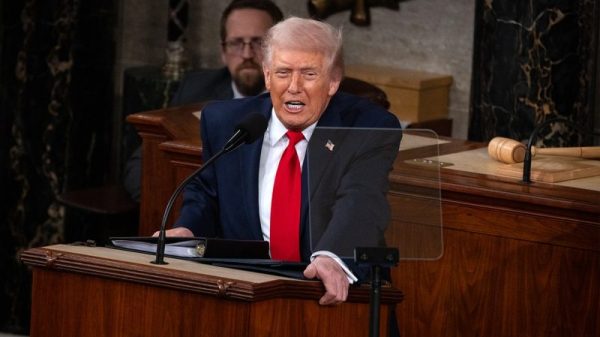The Supreme Court announced Tuesday that it would review a Texas law restricting minors’ access to internet pornography, one of a handful of cases it agreed to accept next term that are focused on First Amendment rights; a Trump-era criminal justice law and the regulatory power of federal agencies.
The court also declined to hear challenges to Illinois gun laws including restrictions on the popular AR-15 rifle and high-capacity magazines, indicating the justices may not be inclined to immediately revisit the hot-button issue of guns after issuing two major rulings during a blockbuster term that ended Monday.
The Texas pornography law requires websites that host sexually explicit content to verify the ages of users. It was challenged by a trade association for the adult-entertainment industry, companies that host sexual content on their websites and an adult-film star.
Their petition says the Texas law imposes significant burdens on adults’ access to “constitutionally protected expression” — in this case, online sexual content — thereby violating their First Amendment rights. The challengers also argue that verification checks pose security and privacy concerns because they expose users to potential leaks, identity theft and extortion.
The Texas legislature passed House Bill 1181 in June 2023 as part of a broader Republican-led effort to limit the amount of sexually explicit materials minors are exposed to. The bill requires websites to use methods such as government-issued IDs to ensure that users are 18 years or older. It prohibits sites from retaining users’ identifying information and requires companies to display health warnings on their websites about accessing sexually explicit content.
The Texas law imposes fines of $10,000 per day that a company operates a website in violation of the age verification requirement and $10,000 per instance that the company retains identifying information. If a minor is exposed to sexually explicit content on a website that violates the age verification requirement, the company will be fined an additional $250,000.
Similar age verification laws have passed in Arkansas, Louisiana, Mississippi, Montana, North Carolina, Utah and Virginia.
U.S. District Judge David Alan Ezra of the Western District of Texas blocked Texas’s age verification requirement last year, saying the law probably violated the First Amendment. But the U.S. Court of Appeals for the 5th Circuit reversed the ruling in March, citing the state’s interest in protecting the welfare of children as well as the Supreme Court’s 1968 ruling in Ginsberg v. New York, which prohibits the sale of obscene materials to minors.
“The age-verification requirement is rationally related to the government’s legitimate interest in preventing minors’ access to pornography. Therefore, the age-verification requirement does not violate the First Amendment,” Judge Jerry E. Smith wrote for the majority.
Pornhub disabled its website in Texas after the 5th Circuit’s ruling and in April, in response to an emergency request, the Supreme Court allowed the Texas law to remain in effect while litigation continued.
The justices will also review the Food and Drug Administration’s regulations for e-cigarettes. The Supreme Court’s decision to accept the vaping case is a key test of the FDA’s authority to regulate flavored e-cigarettes that have become popular among teens but are deemed harmful by public health officials and anti-tobacco organizations. The agency has denied millions of applications for flavored vaping products, arguing the nicotine products are risky and appeal to young people. The vaping industry has responded with numerous lawsuits, arguing vapes are less risky than smokable tobacco products and can help wean adults off cigarettes.
Several appeals courts have sided with the FDA. But in January, a divided 5th Circuit ordered the FDA to reconsider its decision prohibiting two companies from marketing their e-cigarette products. In a stinging decision, the majority said the agency sent manufacturers on a “wild goose chase” of requirements for applications. The lawsuit was filed by Triton Distribution, which asked the agency to approve vaping pen liquids with flavors such as “Signature Series Mom’s Pistachio” and “Suicide Bunny Mother’s Milk and Cookies.”
Until recently, the FDA had denied all applications for flavored e-cigarette products even as illegal ones — often manufactured in China — proliferated in vape shops across the United States. Last month, the agency approved four menthol-flavored products manufactured by tobacco giant Altria Group, in a decision that alarmed anti-tobacco groups. On Tuesday, those groups warned that the Supreme Court siding with the 5th Circuit would cripple the agency’s ability to curb the harms of e-cigarettes used by millions of teens, most of whom prefer flavored products.
The high court this term delivered monumental decisions that legal experts say could upend government efforts to protect public health. The most consequential ruling came Friday when the conservative majority reversed a 40-year-old legal precedent, known as the Chevron doctrine, which required judges to defer to reasonable agency interpretations of ambiguous federal laws.
“In the aftermath of the evisceration of the Chevron doctrine, the stakes for preserving the vital role FDA plays are high,” said Mitch Zeller, the former director of the FDA’s Center for Tobacco Products. “The public and Congress should be very concerned if the court tries to substitute its judgment for that of a science-based regulatory agency.”
The court will also take up two cases dealing with the guidelines for the First Step Act, a bipartisan bill signed by President Donald Trump in 2018 that offers sentencing reductions for nonviolent federal offenders who participate in rehabilitation. The goal is to reduce recidivism and shrink the prison population. It has resulted in the early release of thousands of inmates.
The cases, which have been consolidated, examine a narrow question: whether the act’s sentencing reductions apply to a defendant who was sentenced before the act became law, had their sentence vacated for other reasons and was then resentenced to a new prison term after the law’s enactment.
The Supreme Court is wading into the culture war over transgender rights next term, as well. Last month, the justices agreed to review a Tennessee law that bans gender-affirming care for minors. Senate Bill 1, which was signed into law on March 2, bans puberty blockers, cross-sex hormones and surgery to treat minors diagnosed with gender dysphoria.
The challengers say the ban violates the 14th Amendment’s equal protection clause, which prohibits discrimination on the basis of sex and gender identity.
The Supreme Court announced Tuesday that it would review a Texas law restricting minors’ access to internet pornography, one of a handful of cases it agreed to accept next term that are focused on First Amendment rights; a Trump-era criminal justice law and the regulatory power of federal agencies.
The court also declined to hear challenges to Illinois gun laws including restrictions on the popular AR-15 rifle and high-capacity magazines, indicating the justices may not be inclined to immediately revisit the hot-button issue of guns after issuing two major rulings during a blockbuster term that ended Monday.
The Texas pornography law requires websites that host sexually explicit content to verify the ages of users. It was challenged by a trade association for the adult-entertainment industry, companies that host sexual content on their websites and an adult-film star.
Their petition says the Texas law imposes significant burdens on adults’ access to “constitutionally protected expression” — in this case, online sexual content — thereby violating their First Amendment rights. The challengers also argue that verification checks pose security and privacy concerns because they expose users to potential leaks, identity theft and extortion.
The Texas legislature passed House Bill 1181 in June 2023 as part of a broader Republican-led effort to limit the amount of sexually explicit materials minors are exposed to. The bill requires websites to use methods such as government-issued IDs to ensure that users are 18 years or older. It prohibits sites from retaining users’ identifying information and requires companies to display health warnings on their websites about accessing sexually explicit content.
The Texas law imposes fines of $10,000 per day that a company operates a website in violation of the age verification requirement and $10,000 per instance that the company retains identifying information. If a minor is exposed to sexually explicit content on a website that violates the age verification requirement, the company will be fined an additional $250,000.
Similar age verification laws have passed in Arkansas, Louisiana, Mississippi, Montana, North Carolina, Utah and Virginia.
U.S. District Judge David Alan Ezra of the Western District of Texas blocked Texas’s age verification requirement last year, saying the law probably violated the First Amendment. But the U.S. Court of Appeals for the 5th Circuit reversed the ruling in March, citing the state’s interest in protecting the welfare of children as well as the Supreme Court’s 1968 ruling in Ginsberg v. New York, which prohibits the sale of obscene materials to minors.
“The age-verification requirement is rationally related to the government’s legitimate interest in preventing minors’ access to pornography. Therefore, the age-verification requirement does not violate the First Amendment,” Judge Jerry E. Smith wrote for the majority.
Pornhub disabled its website in Texas after the 5th Circuit’s ruling and in April, in response to an emergency request, the Supreme Court allowed the Texas law to remain in effect while litigation continued.
The justices will also review the Food and Drug Administration’s regulations for e-cigarettes. The Supreme Court’s decision to accept the vaping case is a key test of the FDA’s authority to regulate flavored e-cigarettes that have become popular among teens but are deemed harmful by public health officials and anti-tobacco organizations. The agency has denied millions of applications for flavored vaping products, arguing the nicotine products are risky and appeal to young people. The vaping industry has responded with numerous lawsuits, arguing vapes are less risky than smokable tobacco products and can help wean adults off cigarettes.
Several appeals courts have sided with the FDA. But in January, a divided 5th Circuit ordered the FDA to reconsider its decision prohibiting two companies from marketing their e-cigarette products. In a stinging decision, the majority said the agency sent manufacturers on a “wild goose chase” of requirements for applications. The lawsuit was filed by Triton Distribution, which asked the agency to approve vaping pen liquids with flavors such as “Signature Series Mom’s Pistachio” and “Suicide Bunny Mother’s Milk and Cookies.”
Until recently, the FDA had denied all applications for flavored e-cigarette products even as illegal ones — often manufactured in China — proliferated in vape shops across the United States. Last month, the agency approved four menthol-flavored products manufactured by tobacco giant Altria Group, in a decision that alarmed anti-tobacco groups. On Tuesday, those groups warned that the Supreme Court siding with the 5th Circuit would cripple the agency’s ability to curb the harms of e-cigarettes used by millions of teens, most of whom prefer flavored products.
The high court this term delivered monumental decisions that legal experts say could upend government efforts to protect public health. The most consequential ruling came Friday when the conservative majority reversed a 40-year-old legal precedent, known as the Chevron doctrine, which required judges to defer to reasonable agency interpretations of ambiguous federal laws.
“In the aftermath of the evisceration of the Chevron doctrine, the stakes for preserving the vital role FDA plays are high,” said Mitch Zeller, the former director of the FDA’s Center for Tobacco Products. “The public and Congress should be very concerned if the court tries to substitute its judgment for that of a science-based regulatory agency.”
The court will also take up two cases dealing with the guidelines for the First Step Act, a bipartisan bill signed by President Donald Trump in 2018 that offers sentencing reductions for nonviolent federal offenders who participate in rehabilitation. The goal is to reduce recidivism and shrink the prison population. It has resulted in the early release of thousands of inmates.
The cases, which have been consolidated, examine a narrow question: whether the act’s sentencing reductions apply to a defendant who was sentenced before the act became law, had their sentence vacated for other reasons and was then resentenced to a new prison term after the law’s enactment.
The Supreme Court is wading into the culture war over transgender rights next term, as well. Last month, the justices agreed to review a Tennessee law that bans gender-affirming care for minors. Senate Bill 1, which was signed into law on March 2, bans puberty blockers, cross-sex hormones and surgery to treat minors diagnosed with gender dysphoria.
The challengers say the ban violates the 14th Amendment’s equal protection clause, which prohibits discrimination on the basis of sex and gender identity.





















